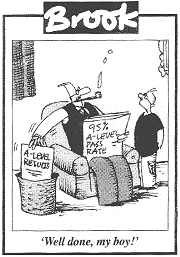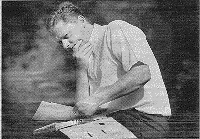Why are we so ashamed of our glorious past?
|
by Peter Hitchens
Imagine yourself coming round in a hospital casualty department,
your memory a blank, your pockets empty or handbag gone. Perhaps you can
still read and count,
perhaps not. In this world of scattered families and long-distance travel,
how will you ever find out who you are? And what use will you ever be again,
to yourself or anyone else?
 |
Play-acting the Bard on a VDU
Shakespeare has arrived karaoke-style on CD-Rom |
More and more, Britain is like just such a patient, a country
lost in amnesia, a people who have suffered a collective blow on the head
which has wiped out our understanding of who we are and what we are for.
Unless we swiftly find a cure, then we will be adrift in a world only, too
ready to take advantage of our weakness. The strange thing about this is
that we have submitted so willingly to this mental castration that some of
our own people have keenly sought to blot out the real past, and reshape
our history into a grey mush of social reform and gender studies.
When communism tried to steal the history of Poland in the
Sixties and Seventies, furious parents risked their liberty to set up "flying
universities" where the truth about the nation's history was taught in secret.
Yet our great free universities, our publishing houses and, above all,
our schools participate with fierce joy in the extirpation of the true history
of this country.
The latest episode in this chapter of national shame is the
dropping of the British Political History syllabus by examination boards
- because it does not make enough profit for them.
Before that, many of the most momentous episodes in the history of this country
were quietly squeezed from the curriculum by the clever trick of making them
optional. How many teachers, how many schools, how many pupils, are going
to opt for the longer course, the tougher exam, the more detailed reading?
Those who do, seek the truth will find literature which offers
a carefully doctored version of the past. The Oxford Children's Encyclopaedia,
for example, constantly soft-pedals the giant civilising achievements of
Britain and its empire, while offering sympathetic and apologetic biographies
of communist leaders.
A mainstream history textbook offered to British secondary
schools reprints a communist anti-war propaganda painting about the horrors
of the Blitz, representing the opinion of a microscopic defeatist minority
at the time.
A schools video produced last year on the Forties barely gives a walk-on
part to Winston Churchill, a man who is being steadily written out of modern
history because he does not fit the fashionable myth that the Tories sympathised
with the Nazis and the Left were the only people who opposed Hitler.
This myth, very different from the truth, has been one of the great engines
behind the constant bombardment of ill-advised "reform" imposed on everything
from our currency to our penal system.
LABOUR'S role in the rise of Hitler was to consistently vote
against the rearmament measures which narrowly saved this country from slavery
in 1940. Stalin's insane orders to the German Communist Party, to refuse
to co-operate with the Social Democrats, virtually ensured the Nazis would
come to power in 1933.
This would be mirrored, six years later, in the joint victory
parade staged by Nazi and Red Army troops in the then-Polish city of Brest,
and the efficient supply of Soviet oil to Germany which fuelled the Nazi
Blitzkrieg and the bombers which tore the heart out of London.
But millions of supposedly educated people know nothing of this, and are
unaware that the one country which behaved with honour and courage when the
fate of the world was being decided was Britain.
And the reason for this lies in a long history of independence
and defiance, in which we repeatedly overcame the most astonishing odds to
survive and triumph.
If the British people of 1940 had known nothing of Drake and Marlborough
and Nelson, of Queen Elizabeth I and William Pitt, of Waterloo, whose anniversary
is today, would they have imagined for a moment that they could stand alone
against the Third Reich?
And Churchill's great speeches, decisive in crushing all
suggestions of a peace treaty during the pivotal summer of 1940, were founded
on his wide and deep knowledge of that past.
Just as important, they were couched in a high-octane language which would
have been beyond anyone who had not been schooled in Shakespeare, the King
James Bible, Milton, Wordsworth and Tennyson - now almost as unfashionable
as proper history.
The great socialist historian AJP Taylor, in his history of
the period, tried to sum up Winston Churchill in a footnote. Without, intending
to, and against his Left-wing instincts, he found himself writing the words:
"The saviour of his country." Taylor knew in his bones that this was the
truth. Could another Churchill - worth 30,squadrons of Spitfires - grow up
in the Britain of today? Would he know the facts, let alone the mighty rhythms
of the English language, necessary to keep us off our knees? Would anyone
understand what, he was talking about?
JUST try if you can to imagine the ghastly world of perverted
science and racial extermination which would have resulted from a British
surrender in 1940. As the American poet Alice Duer Miller said at the time:
"I am American bred: I have seen much to hate here - much to forgive. But
in a world where England is finished and dead, I do not wish to live."
Those who have made a modern Churchill impossible knew what
they were doing. Their continental ideas - state control, regimentation,
bureaucracy, government interference in the smallest parts of life - were
blocked in the past by what they called "prejudice". - the determined opposition
of the voters.
This is one of their favourite words, designed to suggest that people who
hold common-sense opinions are bone-headed oafs, mental cavemen who resist
change out of tribal instinct or plain stupidity.
But what they deride as "prejudice" is often nothing of the
kind. On the contrary, it is the piled-up wisdom of the centuries, the fruit
of the rich store of experience we call history. It is our owner's manual,
our map, our index and our dictionary. Without it, we can barely lace our
shoes.
Amnesiacs, of course, have no prejudice. But they have nothing else, either
- except the ideal qualifications to serve as the slaves of others.
From: Mr David McKenna, Doncaster, South Yorkshire
AS Peter Hitchens points out, we are again witnessing the onward march of
the reform culture that affects our society.
In an attempt to be cost-effective, examination boards are removing the British
Political History syllabus from 1998, because "the number of students doing
the exam has dropped".
I cannot understand why we allow such things to happen.
Presumably, multiplication tables,
grammar, handwriting and I other vital skills
could eventually disappear if students decide to opt for building blocks,
clay work or water play.
The rush to please everyone encouraged a system where no child is told he
or she is not up to the mark.If a subject is difficult;demanding more time
and effort than watching the latest TV soap, then
it is dropped and a more user-friendly substitute adopted.
The snag with the latest decision is in thinking that British
social and economic history can be studied in isolation. The building blocks
of world history are interconnected - you cannot have one without the other.
The whole picture can only be built up as children progress through school,
college and university - studying the impact of one development upon
another.
History enables us to examine the past in order to better understand the
future. Picking and choosing more acceptable bits of the past will only serve
to complicate the issue.
A degree of truthGraduate 'told to ditch qualifications to get a job' |
|||
| by Sue Carr AN out-of-work graduate told by the Jobcentre dumb down his CV in order to get a job. Michael Angliss has a degree in business and economics - but was told to cut that out when listing his qualifications. In between bouts of temporary work, the 41 year old has for hundreds of jobs from graduate positions to office Junior. |
|
||
| But after years of trying to
find work, he has now been told he stands a better chance if he removes his
deree when sending out his CV. Michael, of Furness Avenue, Ashton, said: "To make myself more 'palatable' to employers, my Jobcentre advisor has told me to remove qualifications from my application forms and CV. "I can't understand it, because if I did that I'd have a three year gap in my employment history and how would that look. She has suggested that I should lower my sights but it's not just graduate positons I am applying for, and I've done everything they have asked me to do." Michael, who worked in stock control for seven years before university; recently enrolled on the New Deal programme - a government initiative designed to improve job searching and interview techniques. He added: "When the government launched the New Deal, we were told that it would provide a new start to get the unemployed into employment. They preach about education being a springboard to success but for people like myself, who have worked hard to get qualifications, are now told to lower their sights. "I'm not that old and I've got a lot of work experience but no one seems interested." A spokesman, for Jobcentre Plus said: "The whole object is to match people's skills with the vacancies available We don't comment on individual cases but this is not standard practice." [The Advertiser July 31,2003] |
|||
From raw Deal to job deal
DISILLUSIONED job-seeker Michael Angliss could have ended a
nine-year search for suitable employment after his plight made national
headlines. |
Don't say your disabledBY JAMES DUCKER
|
 'A-levels Are Becoming Meaningless' 'A-levels Are Becoming Meaningless'A-LEVELS are becoming "completely meaningless", company bosses warned, as the row over whether the exam has become too easy to pass flared up again. With, examiners failing fewer than one entry in 20 this year, the Institute of Directors (IoD) said "rampant grade inflation" meant the exam system's gold standard exam no longer presented students with a real test. The Government and teacher unions rejected claims that A-Levels were too easy. But headteachers warned that pupils were opting for so-called "soft" subjects including media studies instead of maths and physics because they had more of a chance of getting into university that way. Ruth Lea, head of policy at the IoD said: "We congratulate all successful A-level students and in no way wish to denigrate the sacrifices and hard work that many pupils have made. "However, we continue to believe that yet another 'record-breaking year' for A-Level pass rates is symptomatic of endemic and rampant grade inflation. "Once again we must ask ourselves what do we want from A-Levels since it is clear that they are becoming increasingly meaningless? They no longer seem to be testing students." She added: "A-levels used to be testing and highly discriminatory - gold standards selecting undergraduates for a highly selective university system - not any more. "They are now designed for an age of mass entrance into universities. As the university system has changed so have A-levels; they have been 'dumbed down'." John Dunford, general secretary of the Secondary Heads Associaiton warned: "It is statistically proven that there is no single standard of A-Level and that grades in maths, physics, chemistry and modern languages are harder to achieve than in psychology and some other subjects. "Since most university courses don't discriminate between grades in different subjects, headteachers are bound to advise students to take subjects in which they can achieve the best grades. "There should be a single standard. That's one of the issues that should be addressed by the Mike Tomlinson review." Mr Dunford was referring to the review of upper secondary education being led by the former chief schools inspector for England. [AOLNews] |
BY GEORGINA LITTLEJOHN
TENS of thousands of teenagers were today told their A-level
passes were 'increasingly meaningless'. |
Amnesi-axe
Cold and sweating
Tired of fretting
The man in the bed tries in vain to remember
Each illustrious thought a dying ember
Main illusion
Still confusion
His mind swept around like a ranging storm
No way to make the memories conform
Wastes away
Back someday
Tracks of tears,testimony to frustration
One spark of neurone fire could cause some new sensation
He looks out
Scorn and pout
Passers by carry on their lives in all normality
Oblivious to this casualty to causality
No grief or pain
Don't go insane
Every thought apparent to their indecisive heads
Stays in all,until the night takes them to their beds
Take for granted
Not enchanted
Each Gold nugget of experience not favoured
Each diamond studded memory not once savoured
Fill the bag
Smoke the fag
Emptying the ashes into the mental ash tray
A fleeting impulse glanced at;thrown away
Fill the void
One annoyed
Vexed and angered at their callous disregard
If only all his brainwaves were not scattered,strewn and charred
Indecision
Old precision
Wishful thinking gives hope to dying facts
Prays they are not victims of the cold amnesi-axe.
Lee [More
Poems]


 A MAN who has applied for hundreds of jobs was told not to mention
a disability to would-be employers because it could prevent him from getting
work. Paul Wilson, 35, of Ashton under Lyne, who has applied for more than
300 jobs, says that when he asked Jobcentre staff in Ashton how he would
be able to account for being unemployed for a long time he was told to "make
up things" that would impress potential bosses. He added: "Despite what they
said, I've always been completely honest when filling out forms." Paul, a
father of one, has been trying to find work since he was disabled in an accident
at the factory where he had worked as a machine operator for seven years.
The Jobcentre in Ashton would not comment. The Department of Work,
said: "We cannot comment on individual cases. Our customers are encouraged
to disclose a disability and give advice as to how to promote themselves."
The Disability Rights Commission said: "Deciding whether to disclose a disability
can be a dilemma but we would always encourage them to be open - and would
expect those helping them to be open too. An employer should take on the
best person, regardless of a disability."
A MAN who has applied for hundreds of jobs was told not to mention
a disability to would-be employers because it could prevent him from getting
work. Paul Wilson, 35, of Ashton under Lyne, who has applied for more than
300 jobs, says that when he asked Jobcentre staff in Ashton how he would
be able to account for being unemployed for a long time he was told to "make
up things" that would impress potential bosses. He added: "Despite what they
said, I've always been completely honest when filling out forms." Paul, a
father of one, has been trying to find work since he was disabled in an accident
at the factory where he had worked as a machine operator for seven years.
The Jobcentre in Ashton would not comment. The Department of Work,
said: "We cannot comment on individual cases. Our customers are encouraged
to disclose a disability and give advice as to how to promote themselves."
The Disability Rights Commission said: "Deciding whether to disclose a disability
can be a dilemma but we would always encourage them to be open - and would
expect those helping them to be open too. An employer should take on the
best person, regardless of a disability."